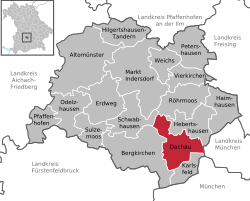Dachau
| Dachau | |
|---|---|
 |
|
| Coordinates: 48°15′37″N 11°26′3″E / 48.26028°N 11.43417°ECoordinates: 48°15′37″N 11°26′3″E / 48.26028°N 11.43417°E | |
| Country | Germany |
| State | Bavaria |
| Admin. region | Oberbayern |
| District | Dachau |
| Government | |
| • Lord Mayor | Florian Hartmann (SPD) |
| Area | |
| • Total | 34.85 km2 (13.46 sq mi) |
| Elevation | 482 m (1,581 ft) |
| Population (2015-12-31) | |
| • Total | 46,705 |
| • Density | 1,300/km2 (3,500/sq mi) |
| Time zone | CET/CEST (UTC+1/+2) |
| Postal codes | 85221 |
| Dialling codes | 08131 |
| Vehicle registration | DAH |
| Website | http://www.dachau.de |
Dachau (German pronunciation: [ˈdaxaʊ]) is a town in Upper Bavaria, in the southern part of Germany. It is a major district town—a Große Kreisstadt—of the administrative region of Upper Bavaria, about 20 kilometres (12 miles) north-west of Munich. It is now a popular residential area for people working in Munich with roughly 45,000 inhabitants. The historic centre of town with its 18th-century castle is situated on an elevation and visible over a great distance.
Dachau was founded in the 9th century. It was home to many artists during the late 19th and early 20th centuries; well-known author and editor Ludwig Thoma lived here for two years. The town is also known for its proximity to the infamous Dachau concentration camp built in 1933 by the Nazis, in which tens of thousands of prisoners died.
The origin of the name is not clearly or certainly known. Some guess it comes from the kelts who lived before the Germans came. Others guess it comes from old high German from daha, which means clay, and ouwe (water overflown land).
As the Amper River would divert into backwaters in several places, there were many fords making it possible to cross the river. The oldest findings of human presence here date back to the Stone Age. The most noteworthy findings were discovered near Feldgeding in the adjoining municipality Bergkirchen. Around 1000 B.C. the Celts arrived in this area and settled. The name “Dachau” originated in the Celtic Dahauua, which roughly translates to “loamy meadow” and also alludes to the loamy soil of the surrounding hills. Some theories assume the name “Amper” river may derive from the Celtic word for “water”. Approximately at the turn of the first millennium the Romans conquered the area and incorporated it into the province of Rhaetia. A Roman trade road between Salzburg and today’s Augsburg is said to have run through Dachau. Remains of this old route are found along the Amper marshlands.
...
Wikipedia


